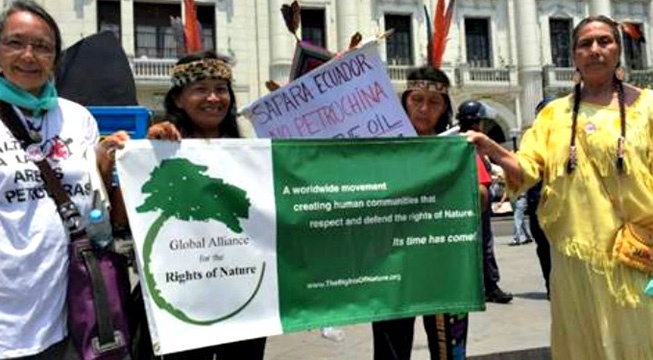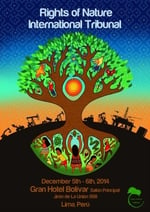Rights of Nature Tribunal in Lima Hears 12 Cases of Rights Violations

Rights of Nature recognize the Earth and all its ecosystems as a living being with inalienable rights: to exist, to live free of cruel treatment, to maintain vital processes necessary for the harmonious balance that supports all life.
The International Rights of Nature Tribunal convened in December, 2014 in Lima, Peru where distinguished judges heard prominent cases evidencing violations to the Rights of Mother Earth and Nature, human rights and rights of indigenous communities. It was the sixth such tribunal held since the formation of the Global Alliance for the Rights of Nature.
Ibero American Regional Leaders from Mexico, Peru, and Colombia attended the tribunal as witnesses and supporters of the initiative promoted by Pachamama Alliance’s partners, the Global Alliance for the Rights of Nature. Pachamama Alliance was instrumental in the founding of and provides financial support to the Global Alliance for the Rights of Nature.
The following is report on the event by Robin Milam, Administrative Director of the Global Alliance for the Rights of Nature.
International Rights of Nature Tribunal, December 5-6, 2014, Lima, Peru
The Global Alliance convened the International Rights of Nature Tribunal in Lima, Peru concurrent with the United Nations Framework Convention on Climate Change (UNFCCC COP 20) in December 2014.

The hearings were an intense, deeply moving two days. One by one experts and witnesses came forward to present facts and stories detailing how individual and communities are impacted by gross violations to Mother Earth and the Rights of Nature.
The intention of the Tribunal is to present a systemic solution to climate change and the condition of our planet within the framework of Rights of Nature. The solution is universal, cross cultural, and deeply rooted in indigenous wisdom. Casey Camp-Horinek, Ponca of Oklahoma, USA told how “fracturing the skeleton of Mother Earth” for oil and gas is killing indigenous communities across the United States. Her own 600-person Ponca Nation is burying one relative a week due to death from cancer and other diseases. She spoke movingly about feeling frequent earthquakes in an area that was not prone to earthquakes before hydraulic fracking began. The shaking is all the more riveting to raw emotions dealing with the deep personal loss and the destructive impact of extractive industries on humans and nature.

Sônia Guajajara, the national coordinator of Brazil's Association of Indigenous Peoples (APIB), described the expansive flooding of the Amazon basin in Brazil caused by construction of the massive Belo Monte Dam. Tens of thousands of indigenous peoples are being dislocated as their traditional homeland becomes buried under water. This one dam will devastate over 516 km2 of the Brazilian Amazon. Brazil is building a series of hydroelectric power dams throughout the Amazon to fuel the prodigious demands of aluminum smelters and a burgeoning economy. Furthermore seasonal water levels create questions about Belo Monte's ability to provide proposed uninterrupted power and may require additional dams upstream to insure water supplies.
Repeated stories of the violations to Rights of Nature and to the Defenders of the Earth deepened resolve and the sense of urgency. Widows with their children from Ecuador and Peru spoke of the murder and disappearance of their husbands from communities who have been fighting the expansion of mining and oil extraction in South America.
Ecuadorian Shuar leader Jose Tendetza was found murdered only days before he was to present the Condor Mirador Mine Case to the Tribunal in Lima. The Tribunal was dedicated to Jose’s memory.
Pablo Solon, former Bolivian Ambassador to the UN and Executive Director of Focus on the Global South, and colleagues provided clear evidence that false solutions for Climate Change such as geoengineering and carbon market mechanisms employed in REDD projects are systemic violations to Mother Earth and Rights of Nature. Nnimmo Bassey, Nigerian Director–Health of Mother Earth Foundation, presented the dramatic impacts of Climate Change especially related to flooding, growing water scarcity, and fossil fuel extraction across Africa. “If we decide to hold back and watch what happens, then Africa is cooked!”
Yasunidos
Spirits soared as the Yasunidos Collective burst into the room singing and dancing after days of being repeatedly detained by Ecuadorian police who ultimately confiscated their bus. Yasunidos is a group of young activists who are calling for the Ecuadorian government to halt oil development in the fragile Yasuní National Park and to protect one of the most bio-diverse regions on our planet. The proposed development presents gross ecological threats to pristine rainforests, impacts some of the few indigenous communities in the world who still live in isolation, and is a violation to Rights of Nature and the Ecuadorian Constitution.
The Climate Caravan left Mexico several months before in route to Lima. The young Yasunidos group joined the caravan as they came through Ecuador to give a global voice to their stand in defense of Yasuní. In spite of the delays and blatant harassment by Ecuadorian officials, the group hired another bus and arrived in time to present their case to the Tribunal.
Yasunidos manifests the resiliency of communities and organizations who are saying "Stop this madness!" The International Tribunal and related locally hosted Tribunals examine the evidence, propose remediating solutions, and give voice to the global call to transform human consciousness, redesign failing, consumptive economic and social structures, and create a framework for living in harmony with nature grounded in the recognition of the Rights of Mother Earth.
Next Steps: 2015 International Rights of Nature Tribunal, Paris, France
The United Nations Framework Convention on Climate Change will culminate at COP 21 in Paris, December 2015. According to the UN FCCC COP21 organizing committee, the objective of the 2015 conference is to achieve, for the first time in over 20 years of UN negotiations, a binding and universal climate agreement by all the nations of the world. To date the UN FCCC has been unable to propose a viable agreement to correct the conditions of climate change and the heating of our planet.
The Global Alliance will host a third International Tribunal for the Rights of Nature concurrent with the Paris UN FCCC COP with the intent of providing systemic Rights of Nature based alternatives to the false solutions and failed negotiations of governing states. The Lima Tribunal accelerated the growing momentum for the Rights of Nature movement and expansion of the unique forum the International Tribunal provides transcending cultural boundaries in a unified demand to create a framework for living in harmony with nature grounded in the recognition of the Rights of Mother Earth.
More Information on the Tribunal and Cases
Tribunal verdicts, videos and details of each of the cases on the Global Alliance website.
David Hill of the Guardian published a compelling article, Fracking and Lima Climate Talks Slammed at Rights of Nature Tribunal saying "It’s difficult to know what was more moving or arresting" as he went on to describe the intimate testimony of indigenous leaders describing "being fracked to death" and Nnimmo Bassey declaring that “business as usual means cooking Africa”.
At the conclusion of the International Tribunal, key members including Nnimmo Bassey (Nigeria – Health of Mother Earth Foundation), Atossa Soltani (USA – Amazon Watch), Tom BK Goldtooth (Turtle Island, USA – Indigenous Environmental Network), Pablo Solon (Bolivia – Focus on the Global South), and Osprey Orielle Lake of WECAN, presented outcomes at a Rights of Nature Tribunal Press Conference inside UNFCCC COP 20 in Lima. View U Press Conference.
Also in Lima, the Alliance hosted a Rights of Nature Tribunal report out event at the People's Summit and marched with indigenous partners from the North and the South and some 200,000 participants in the Peoples' Climate March through the streets of Lima.
Learn more about the Global Alliance for the Rights of Nature.